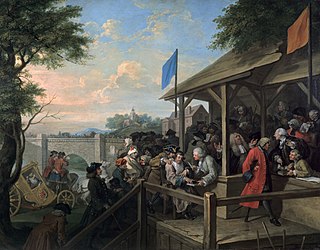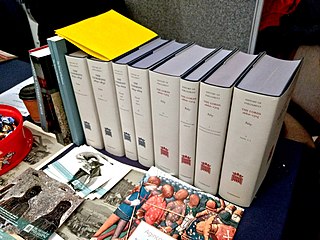
Ipswich is a constituency represented in the House of Commons of the UK Parliament since July 2024 by Jack Abbott of the Labour Party.
Berkshire was a parliamentary constituency in England, represented in the House of Commons of the Parliament of England until 1707, then of the Parliament of Great Britain from 1707 to 1800 and of the Parliament of the United Kingdom from 1801 to 1885. The county returned two knights of the shire until 1832 and three between 1832 and 1885.
Dunwich was a parliamentary borough in Suffolk, one of the most notorious of all the rotten boroughs. It elected two Members of Parliament (MPs) to the House of Commons from 1296 until 1832, when the constituency was abolished by the Great Reform Act.

Oxfordshire was a county constituency of the House of Commons of the Parliament of England then of the Parliament of Great Britain from 1707 to 1800 and of the Parliament of the United Kingdom from 1801 to 1885. It was represented by two Members of Parliament. In 1832 this was increased to three Members of Parliament. The constituency was abolished in 1885, being split into three single member divisions.
New Romney was a parliamentary constituency in Kent, which elected two Members of Parliament (MPs) to the House of Commons from 1371 until 1832, when it was abolished by the Great Reform Act.
William Danvers of Chamberhouse Castle in Thatcham, Berkshire, was a British judge. He was a Serjeant-at-Law and a Justice of the Peace.

The History of Parliament is a project to write a complete history of the United Kingdom Parliament and its predecessors, the Parliament of Great Britain and the Parliament of England. The history will principally consist of a prosopography, in which the history of an institution is told through the individual biographies of its members. After various amateur efforts the project was formally launched in 1940 and since 1951 has been funded by the Treasury. As of 2019, the volumes covering the House of Commons for the periods 1386–1421, 1509–1629, and 1660–1832 have been completed and published ; and the first five volumes covering the House of Lords from 1660 to 1715 have been published, with further work on the Commons and the Lords ongoing. In 2011 the completed sections were republished on the internet.
Robert Howden was an English politician.
Until the Reform Act 1832, there were eight constituencies in the Parliament of England and its successors related to the Cinque Ports. The cinque port constituencies were slightly different from parliamentary boroughs. The 1832 Act abolished most such distinctions, and disfranchised some of the cinque ports as rotten.
John Sydenham, of Somerset, was MP for the Bridgwater constituency of the parliament of England six times between 1377 and 1397. He was recorded as a tax collector in Somerset in 1382, 1392 and 1401. During the Peasants' Revolt of 1381 his manor house at Sydenham, near Bridgwater was ransacked and goods to the value of £100 stolen. His daughter Ida married Robert Boson, who was MP for Bridgwater in the 1393 parliament.
William Debenham was a Member of Parliament and a merchant. His years of birth and death are unrecorded.
Robert Lucas was one of the two MPs for Ipswich in 1406.
John Felbrigg was one of the two MPs for Ipswich in 1407.
John Rous was one of the two MPs for Ipswich in 1410 and November 1414. He was a merchant in the Staple of Calais and was survived by his widow, Joan.
James Andrew was one of the two MPs for Ipswich in a variety of English Parliaments from 1410 to December 1421.
William Debenham was one of the two MPs for Ipswich in a number of English parliaments from November 1414 to 1437.
John Knepping was one of the two MPs for Ipswich in the English parliaments in 1420.
John Wood was one of the two MPs for Ipswich in the English parliaments of 1420.
Thomas Kempstone was one of the two MPs for Ipswich in the English parliament of December 1421.
William Weathereld was one of the two MPs for Ipswich in the English parliaments of December 1421 and 1429 and possibly the parliament of 1447.



